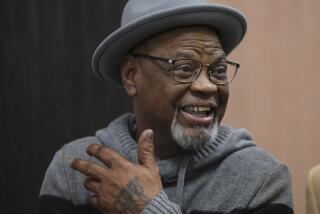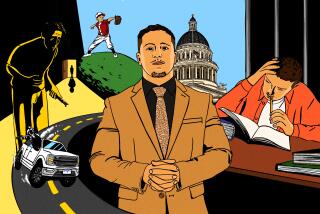34 years after being wrongly convicted, a man savors his new freedom
Kash Delano Register sat in a park Sunday afternoon, taking it all in.
He felt the sun on his face and the breeze coming in from the ocean. He heard the sound of birds and children playing.
“This is really beautiful,” he said. He was smiling, but there were tears in his eyes.
Register spent more than three decades in prison for the 1979 murder of an elderly man in West Los Angeles. He always maintained his innocence, and Friday he was released from jail after a judge overturned the conviction.
Attorneys from Loyola Law School’s Project for the Innocent argued that a key witness in the case had lied and that police and prosecutors had suppressed evidence that would have helped Register’s defense.
Register, who has spent his first days of freedom getting reacquainted with family and a city he last saw when Jimmy Carter was president, said he is overcome with relief.
“In the mornings I just lay there and I look at the ceiling and I just thank God that I’m home,” he said.
Register was 19 when he was convicted of murder. He is 53 now. During his long incarceration, he missed out on a lot of life, such as the birth of his daughter shortly after he was locked up and, years later, the arrival of two grandchildren.
He had been in love with his girlfriend, the mother of his daughter, but what with him in prison, they agreed that it made sense for her to move on romantically.
“I had to be man enough to try to accept that,” he said. “I wanted her to go and live her life.”
Register says he was at home with his girlfriend one afternoon in April 1979 when 78-year-old Jack Sasson was shot five times in his carport. Brenda Anderson, a neighbor of Sasson’s and a high school classmate of Register’s, told police she heard gunshots and saw an African American man she later identified as Register sprinting from the scene.
He was sentenced to 27 years to life in prison, despite scant physical evidence linking him to the crime and the fact that a murder weapon was never recovered.
While serving out his sentence in a handful of prisons including San Quentin State and Folsom State, Register kept up a regular exercise regimen, completed several vocational training courses and worked on his case. Each time he appeared before the parole board, he refused to admit guilt.
In 2011, one of Anderson’s sisters, Sheila Vanderkam, came forward with a new story. She said she and Anderson had heard gunshots the day Sasson was killed but hadn’t been close enough to get a good look at the shooter. She said that she told police about her doubts at the time but that they threatened her and told her to stay quiet.
She took the stand in a hearing on the case last month, along with Anderson, who seemed to recant her testimony, saying the shooter “may or may not have been” Register.
Los Angeles County prosecutors said they would decide by next month whether to appeal the judge’s decision to overturn the murder conviction, retry Register or drop the case. Register’s attorneys say he may seek compensation for the wrong conviction.
Given his ordeal, it would be understandable if Register were angry. But sitting at a picnic table near the La Brea Tar Pits, he gave off an air of forgiveness and peace.
“There’s a lot of devastating things that happened to me, but there’s nothing I could do about it, so I had to accept it as it was,” said Register, a devout Christian who attended dozens of self-help workshops while in prison. “Me being angry is only going to stagnate me moving forward.”
Eventually he will start looking for work, but for now Register is focusing on getting used to what he calls “real life.”
He has taken trips with friends to the mall to buy new clothes and is learning how to operate a smartphone. “I’ve got little kids 13 and 12 showing me how to use it,” he said, laughing. “I had to put my pride down.”
He says he is relishing the chance to take care of his mother, Wilma. While he was in prison, Register said, “she was my life support. She knew I didn’t do it, and she stuck by me from Day One.”
Now, he said, it’s time to “let her relax and let me take care of things.”
She was there when he got out of jail to drive him back to her West L.A. home, the same place he was living when his life took an unimaginable turn.
“I just hugged her and I kissed her,” he said. “There wasn’t much to say.”
More to Read
Sign up for Essential California
The most important California stories and recommendations in your inbox every morning.
You may occasionally receive promotional content from the Los Angeles Times.











